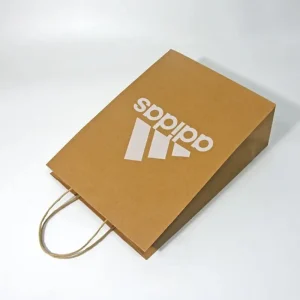Finding the Best Wholesale Paper Bag Supplier: An Astute Procurement Guide and Industry Insight
In today’s market environment, which emphasizes environmental protection and brand image, paper bags have transcended their simple carrying function to become mobile billboards for brands and a declaration of sustainable commitment. Whether for retail stores, the food and beverage industry, event planning, or e-commerce shipping, finding a stable, reliable, and cost-effective wholesale paper bag supplier is a crucial task for business owners and procurement managers.
However, “the best” is not absolute. The most suitable wholesaler for you depends on the specific needs of your business. Blindly searching for the “cheapest” supplier might lead you into difficulties like delivery delays and quality inconsistencies. Therefore, before starting your search, begin by asking yourself these key questions:
- Demand and Scale: What is your monthly order volume – in the thousands or just hundreds?
- Customization Needs: Do you require detailed logo printing, spot colors, or special finishes like foil stamping or lamination?
- Product Type: Do you need standard shopping bags, high-end gift bags, food-grade greaseproof bags, or eco-friendly handled bags?
- Quality vs. Budget Balance: What are your specific requirements for paper weight, handle strength, and load-bearing capacity?
- Delivery Timeline: How urgent is your project schedule?
Clarifying these needs is the first step to successfully finding your “best” partner.

In-Depth Analysis of Main Wholesale Channels
The wholesale channels for paper bags in the market can be mainly divided into the following categories, each with its own advantages and disadvantages.
- Source Manufacturers: Pursuing Ultimate Cost-Effectiveness and Deep Customization
If you have stable and substantial order volumes (typically with minimum order quantities in the thousands or even tens of thousands), cooperating directly with a factory is the option with the lowest cost and highest degree of customization freedom.
Advantages:
- Price & Quality Control: Eliminates middlemen, offering factory-direct prices and allowing for quality monitoring from the source.
- Complete Customization: Offers full personalization across dimensions, materials, and processes.
Challenges:
- High MOQ & Lead Times: Often do not accept small batch orders. Production cycles can be longer.
In this field, some leading companies have set industry benchmarks. For instance, consider Fujian Nanwang Environment Protection Scien-Tech Co., Ltd. A national high-tech enterprise, the company has been deeply engaged in eco-friendly paper bags for years. It not only possesses large-scale production facilities but has also established a complete R&D, design, and manufacturing system. For brand clients seeking high-end customization and stable bulk supply, partnering with a listed company possessing such strong production capabilities and technical expertise often signifies guaranteed quality and supply chain stability. Their product lines typically cover multiple fields, capable of simultaneously meeting the stringent requirements of diverse scenarios like brand retail, food and beverage, and fashion shopping.
- Wholesalers & Distributors: Guarantees of Flexibility and Rapid Response
These suppliers purchase stock from multiple factories or undertake small to medium-sized custom orders, acting as a buffer for inventory and service.
Advantages:
- Low MOQ: Ideal for startups or trial orders.
- Stock Supply & Quick Response: Fast delivery speeds and often better service experience.
Challenges:
- Price & Customization Limits: Unit prices are higher. Customization options may be limited by their partner factories’ capabilities.
- Online B2B Platforms: Convenient “One-Stop” Comparison
Platforms represented by gather a massive number of manufacturers and traders.
Advantages:
- Rich Selection & Transparent Transactions: Easily compare dozens of suppliers.
- Small Batch/Mixed Batch Orders: Extremely flexible.
Challenges:
- Inconsistent Quality: Requires careful vetting; always request physical samples first.
Professional Advice Beyond Channel Selection
After determining the channel direction, the following action steps are crucial.
Step 1: Always Request Physical Samples
Pictures and descriptions can never fully represent the physical product. Feel the paper texture personally and test the handle strength. It’s worth mentioning that companies like Nanwang, which focus on brand reputation, are usually very willing to provide comprehensive sample kits, allowing clients to intuitively feel the differences between paper weights and printing techniques, which greatly aids in making the right decision.
Step 2: Conduct a “Stress Test”
Place the items you plan to carry inside the sample bag and simulate daily use. A high-quality paper bag must withstand the test of practical application.
Step 3: Communicate Deeply, Assess Comprehensive Capability
Ask potential suppliers specific questions. Beyond price and lead time, consider inquiring about their environmental certifications (like FSC certification) and R&D capabilities. Industry leaders often continuously invest in eco-friendly materials (such as using paper from sustainable forest sources) and lightweight design, which not only meets your procurement needs but also reinforces your brand’s commitment to sustainability.
Step 4: Calculate the Total Cost of Ownership
Don’t focus solely on the unit price. Include factors like shipping costs and plate fees to calculate the final cost per bag.
Conclusion
Finding the best wholesale paper bag supplier is a process of precisely matching your own needs with market supply. For businesses with large volumes and a pursuit of brand uniqueness, deeply engaging with manufacturers like Nanwang, which possess strong R&D and production capabilities, is a long-term strategy. For small and medium-sized buyers with flexible needs, excellent wholesalers or online platforms are more flexible choices.
Invest time in preliminary research and verify supplier reliability through samples and communication. In this process, understanding the standards and practices of industry leading enterprises, even if you don’t ultimately partner with them, can provide a valuable benchmark for quality and service, helping you make more astute procurement decisions and find a strategic partner that truly fuels your brand’s growth.





